|
|
| |
|
| |

Pioneers in
Arts, Humanities, Science, Engineering, Practice (PAHSEP)
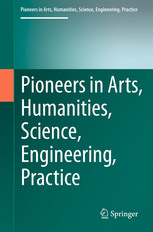
Edited by
Hans Günter Brauch,
AFES-PRESS, chairman
Free University of Berlin (Ret.)
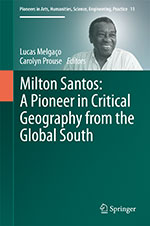
|
Lucas Melgaço - Carolyn Prouse (Eds.): Milton Santos: A Pioneer on Critical Geography from the Global South (Cham– New York – Heidelberg – Dordrecht – London: Springer International Publishing, 2017).
ISBN: 978-3-319-53825-9 (Hardcover)
ISBN: 978-3-319-53826-6 (EBook)
Doi: 10.1007/ 978-3-319-53826-6 _ (add chapter no.)
Order this book on Springer Website |
| |
|
- Makes the Latin American Santos's work accessible to the English speaking world
- Introduces Santos' main theories and concepts and documents how they are applied to several research areas in the social sciences
- Presents short chapters of up to 5000 words to make Santos's theories more accessible and easy to read
For decades, Milton Santos (1926-2001) has been considered one of the most influential thinkers in Brazilian and Latin American social sciences and geography. Yet his writings, most of which have not been translated into English, are largely unknown to European and North American audiences. This book introduces English-speaking scholars to Professor Santos through critical engagement with his ideas and writings. The chapters presented here reveal the breadth and originality of his critical thought, as well as its ongoing importance to contemporary debates. The book features a biography of Santos and includes an annotated translation of one of his most-cited texts, The Return of the Territory, offered here for the first time in English. This text demonstrates how Santos’s provocative insights continue to transform core concepts of political and human geography. The book also includes a number of short chapters written by scholars from Brazil, Spain and France. Through reflections on Santos’s work, the various authors demonstrate the value and possibilities of extending the geographer’s theories. They explore key geographical themes across political economy, rural studies, territorial planning, environmental crisis, digital networks, indigenous peoples, transportation and public health. This collection invites geographers from around the world to engage with this rich intellectual tradition from Brazil.
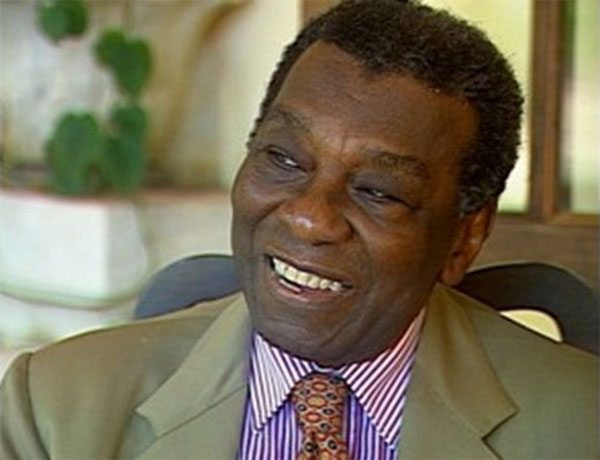
|
| |
|
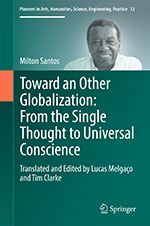 |
Lucas Melgaço - Tim Clarke (Eds.): Milton Santos: Toward an Other Globalization From the Single Thought to Universal Conscience (Cham- New York - Heidelberg - Dordrecht - London: Springer International Publishing, 2017).
ISBN: 978-3-319-53891-4 (Hardcover)
ISBN: 978-3-319-53892-1 (EBook)
Doi: 10.1007/ 978-3-319-53892-1 _ (add chapter no.)
Order this book on Springer Website |
| |
• Offers a new perspective, an approach to globalization by an author from the "Global South"
• Appeals to many specialists in the social sciences, as the book was conceived not only for geographers but for a heterogeneous public
• Features a special chapter on "transition on the march" to help readers understand movements like the Arab Spring
This book presents an alternative theory of globalization that derives not from the dominant perspective of the West, from which this process emerged, but from the critical vantage point of the Third World, which has borne the heaviest burdens of globalization. It offers a critical and uniquely first-hand perspective that is lacking not only from the apologists of Western hegemony, but from most scholars writing against this hegemony from within the globalizing world. Renowned throughout Latin America and parts of Europe, the author, Brazilian geographer Milton Santos, has long been for the most part inaccessible to the English-speaking world. Only one of his books, The Shared Space: The Two Circuits of the Urban Economy in Underdeveloped Countries, published in 1975, has been translated into English; nevertheless, the works of Santos's most important phase, from the 1980s until his death in 2001, have remained unavailable to English readers. With the translation of Toward an Other Globalization, one of the last works published in Santos’s lifetime, this situation has finally been rectified. In this book, Santos argues that we must consider globalization in three different senses: globalization as a fable (the world as globalizing agents make us believe), as perversity (the world as it is presently, in the throes of globalization), and as possibility (the world as it could be). What emerges from the analysis of these three senses is an alternative theory of globalization rooted in the perspective of the so-called Global South. Santos concludes his text with a message that is optimistic, but in no way naïve. What he offers instead is a revolutionary optimism and, indeed, an other globalization. |
| |
|
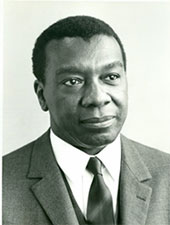
|
Milton Almeida dos Santos (1926–2001) was one of the most important and prominent geographers in the so-called Global South. Despite his specialization in themes such as urban studies, developing countries and globalization, his main contributions to human science are his expansive theorizations operating well beyond any specific subdiscipline of geography, creating what could be called today a ‘Miltonian School of Geographic Thought’. He assembled a set of coherent and complementary concepts and ideas that together explain different spatial phenomena.
Born in Brotas de Macaúbas, Brazil, Santos first obtained a degree in law, but his passion from his earliest professional years was geography. He worked in high schools as a teacher of geography, in journalism and in politics before starting his academic life as a geographer. He completed his Ph.D. in Geography in 1958 at the University of Strasbourg, France, under the supervision of Prof. Jean Tricart. Returning to Brazil, Santos worked in different universities until 1964, when a military coup d’état ousted Brazil’s democratically elected government. Santos was arrested by the military police and was released on the condition that he be deported. During 13 years of exile Santos worked as an academic in different countries in Europe, North America and Africa.
In 1977 Santos returned again to Brazil and from 1983 onwards was affiliated with the University of São Paulo where he worked until he passed away on 24 June 2001 at the age of 75. Santos received the honoris causa distinction from 20 universities. His impressive academic production includes almost 300 scientific articles and more than 40 books, including classics like The Shared Space, A Natureza do Espaço and Toward an Other Globalization. Milton Santos was the only geographer from outside the Euro-Anglo world to be awarded the Vautrin Lud International Prize, considered the Nobel Prize of Geography.
|
| |
On the Translators and Editors of both volumes
Lucas Melgaço is an Assistant Professor in the Department of Criminology of the Vrije Universiteit Brussel (VUB), Belgium where he combines his background in geography with his specialization in security, surveillance and policing studies. He holds a doctorate degree in Geography from a partnership between the University of São Paulo (USP) and the University of Paris 1—Panthéon Sorbonne with a thesis entitled ‘Urban securitization: from the psychosphere of fear to the technosphere of security’. Lucas is a former post-doctoral researcher at the Crime and Society Research Group (CRiS) at the VUB, at the Surveillance Studies Centre at Queen’s University, Canada and at the Department of Geography of the Federal University of Rio de Janeiro (UFRJ). His main scientific interests are in the domains of urban security, urban conflicts, surveillance, public order, social movements and protests, and in the relationships between information and communication technologies and security. He has also worked on translating and introducing the theories of Milton Santos to the English-speaking community. Lucas is editor-in-chief of the journal Criminological Encounters.
Carolyn Prouse is a doctoral candidate in the Department of Geography at the University of British Columbia (UBC) in Vancouver, Canada. She holds a Master’s degree and bachelor’s degree from Queen’s University in Kingston, Canada. Carolyn has spent time at the University of São Paulo and at the cultural and research institute Barraco #55 in Complexo do Alemão, Rio de Janeiro, Brazil. Her research interests are in urban studies, critical development studies and critical health geographies. She operates conceptually at the nexus of postcolonial/decolonial and anti-racist feminist approaches.
Tim Clarke is a PhD candidate and part-time instructor in the Department of English at the University of Ottawa, Canada, where he is completing a dissertation on the genealogy of Spinozist thought in the work of Ralph Waldo Emerson and a range of American modernist literature. His research interests include American literature, literary modernisms, the philosophies of Baruch Spinoza and Gilles Deleuze, and the intersections between philosophical and literary discourses.
|
| |
On the Contributors to volume 11
Sarita Albagli is a sociologist with a Ph.D. in Geography. She is a Senior Researcher at the Brazilian Institute of Information in Science and Technology (IBICT), and Senior Lecturer in the Post-Graduate Program in Information Science, developed by IBICT and the Federal University of Rio de Janeiro (UFRJ). She coordinates the Interdisciplinary Laboratory on Information and Knowledge Studies (Liinc) and she is Editor of the scientific journal Liinc em Revista. Her research interests include the following topics: information, knowledge and social innova- tion; open and collaborative science and technology; network and territorial informational dynamics.
Aurélien Reys is a geographer who specializes in Development Geography. He wrote his Ph.D. dissertation on the Brazilian gemstones industry. He is currently a Post-doctoral Researcher at the Centre de Coopération International en Recherche Agronomique pour le Développement (CIRAD). His current research focuses on the impacts of agricultural investment on household livelihoods and food security in East Africa.
Eliza Pinto de Almeida holds bachelor, Master’s and Ph.D. degrees in Geography from the University of São Paulo (USP). She is Associate Professor in the Institute of Geography, Development and Environment at the Federal University of Alagoas. Her scientific interests include the relationships between territory and health with an emphasis on the organization of public health services.
Samuel Frederico has graduate (2002) and Master’s (2004) degrees in Geography from the State University of Campinas, and a Ph.D. (2009) in Human Geography from the University of São Paulo, with a doctoral internship (2007/08) held at the Université de Toulouse II Le Mirail, France. He is currently Assistant Professor at the São Paulo State University (UNESP—Rio Claro) and Assistant Professor of the Graduate Program in Geography at the State University of Campinas (Unicamp). Samuel’s research is in Economic and Regional Geography, and focuses on the following themes: modernization and expansion of Brazilian agriculture; competitive regions; urban-rural relationships; agro-logistics; the sugarcane industry; coffee production; soybeans; and financial capital and agribusiness.
Marina Castro de Almeida has a graduate (2002) degree in Geography from the Pontifical Catholic University of São Paulo, a Master’s (2005) in Geography from the State University of Campinas, and Ph.D. (2013) in Human Geography from the University of São Paulo, with a doctoral internship (2012) held at the City University of New York (CUNY). She is currently Assistant Professor at the Minas Gerais Triangle Federal University (UFTM). Her research in Geography has an emphasis in Economic Geography, focusing on the following themes: globaliza- tion; uneven geographical development; territorial distribution of business services; and precarious work.
Luís Angelo dos S. Aracri holds bachelor, Master’s and doctoral degrees in Geography from the Federal University of Rio de Janeiro (UFRJ). Since 2011 he has been Associate Professor at the Federal University of Juiz de Fora (UFJF). His scientific interests include: technological transformations and their impacts on the organization of territory; dynamics of regional productive structures; and the political economy of the territory.
Fabrício Gallo holds bachelor, Master’s and doctoral degrees in Geography from the State University of Campinas (UNICAMP), Brazil. He is an Assistant Professor in the Department of Territorial Planning and Geoprocessing (DEPLAN) of Universidade Estadual Paulista (UNESP). His scientific interests include Brazilian territorial integration with emphases on federalism; intergovernmental transfers of public resources; and territorial politics.
Júlia Adão Bernardes is a Professor in the Department of Geography at the Federal University of Rio de Janeiro (UFRJ), where she also completed her bachelor (1974), and Master’s (1983) degrees. She holds a Ph.D. (1993) in Human Geography from the Universitat de Barcelona, Spain. Julia’s interests include economic geography; regional geography; and modernization of Brazilian agriculture.
Roberta Carvalho Arruzzo holds bachelor (2002), Master’s (2004) and doctoral (2009) degrees in Geography from the Federal University of Rio de Janeiro (UFRJ). In 2011 and 2012 she engaged in teaching and research activities at the same university. She is currently Assistant Professor at the Rural Federal University of Rio de Janeiro, Coordinator of the Research Group of Territorial Resistance (COLETIVO), and a researcher with the research group Geography and Indigenous Peoples (Geopovos) at the same institution. She has experience in the fields of Human Geography and Agricultural Geography and for more than ten years has been studying the territorial relations between the modernization of agriculture and indigenous peoples.
Maria Tereza Duarte Paes graduated (1985) from Geography at the Universidade Estadual Paulista (UNESP). At the State University of Campinas (UNICAMP) she concluded a Master’s (1992) degree in Sociology and a Ph.D. (1999) in Social Sciences. She has been Professor at UNICAMP since 1994: first in the Sociology Department and, from 1999 onwards, in the Geography Department. In 2007 she concluded a Post-doc in Geography at the Université de Pau et des Pays de L’Adour in France. Her research is focused on cultural heritage, tourism and the urban environment, and she coordinates the research group Geography, Tourism and Cultural Heritage.
Claudia Levy holds a Master’s (2006) in Geography from the State University of Campinas (UNICAMP). She completed a Joint International M.Sc. (2008) on Regional Development Planning and Management at the University of Dortmund in Germany and the Kwame Nkrumah University of Kumasi in Ghana under a DAAD scholarship. From 2009 to 2013 she was a Researcher associated with the German Institute for Tropical and Subtropical Agriculture (DITSL), joining the International Center for Development and Decent Work (ICDD) at the University of Kassel in Germany. Within this international network her Ph.D. was completed in 2016 with her project on rural livelihoods and farmer groups in Mozambique.
Francisco J. Toro is an Associate Professor in the Department of Regional Geographical Analysis and Physical Geography. His doctoral dissertation, com- pleted in 2011, was entitled ‘Crisis ecológica y geografía: Planteamientos y prop- uestas en torno al paradigma ecológico-ambiental’. The main foci of his research publications are theoretical and critical approaches to sustainability and degrowth; the relationship between environmental identity and urban space; and environ- mentalism within anarchist geographic thinking. He has recently contributed a chapter to The Radicalization of Pedagogy: Anarchism, Geography, and the Spirit of Revolt (2016) and is Co-editor of Historical Geographies of Anarchism: Early Critical Geographers and Contemporary Challenges.
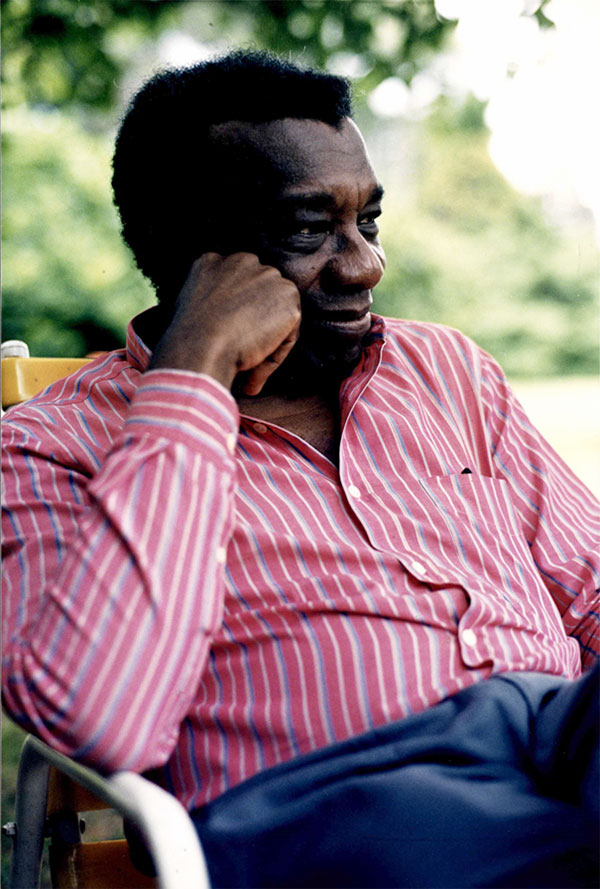
|
| |
Important Links on Milton Santos
Selected Videos with Milton Santos
|
| |
Books by and on Milton Santos
Book in English
|
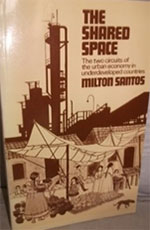 |
Santos, M. (1979).
The shared space:
The two circuits of the urban economy in underdeveloped countries.
London and New York, Methuen. |
|
| |
| |
|
 |
Lucas Melgaço - Carolyn Prouse (Eds.): Milton Santos:
A Pioneer on Critical Geography from the Global South
(Cham– New York – Heidelberg – Dordrecht – London:
Springer International Publishing, 2017). |
 |
Lucas Melgaço - Tim Clarke (Eds.): Milton Santos:
Toward an Other Globalization
From the Single Thought to Universal Conscience
(Cham- New York - Heidelberg - Dordrecht - London:
Springer International Publishing, 2017).. |
| |
|
|
Book in French |
|
| |
|
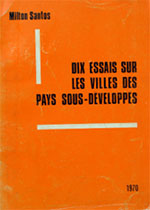 |
Santos, M. (1970).
Dix essais sur les villes des pays sous-développés.
Paris: Ophrys. . |
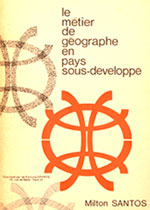 |
Santos, M. (1971).
Le métier du géographe en pays sous-développés.
Paris: Ophrys. . |
| |
|
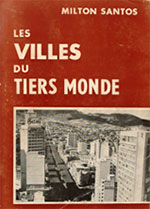 |
Santos, M. (1971).
Les villes du tiers monde.
Paris: M.-Th. Génin, Librairies Techniques.. |
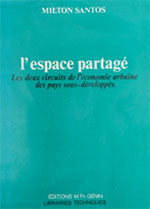 |
Santos, M. (1975).
L'espace partagé.
Paris: M.-Th. Génin, Librairies Techniques.. |
| |
|
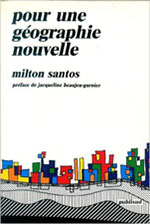 |
Santos, M. (1985, 1991).
Pour une géographie nouvelle.
Paris: Editions Publisud. |
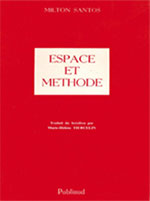 |
Santos, M. (1990).
Espace et méthode.
Paris: Publisud. . |
| |
|
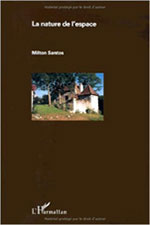 |
Santos, M. (1997).
La nature de l‟ espace: Technique et temp;
Raison et émotion.
Paris: L‟Harmattan. |
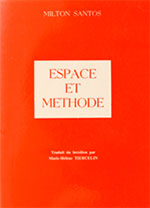 |
| |
| |
|
Book in Spanish |
|
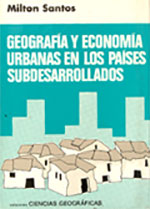 |
Santos, M. (1973).
Geografia y economia urbanas en
los países subdesarrolados.
Barcelona: Oikos-Tau. |
|
Santos, M. (1986).
Espacio y metodo.
Barcelona:
Geocritica, 65, Septiembre,
Universidad de Barcelona.. |
| |
|
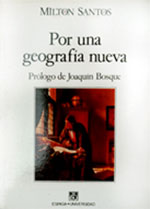 |
Santos, M. (1990).
Por una geografia nueva.
Madrid: Espasa-Calpe. |
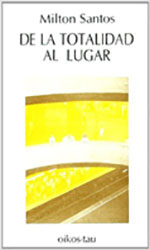 |
Santos, M. (1996).
De la totalidad al lugar.
Barcelona: Oikos-Tau. . |
| |
|
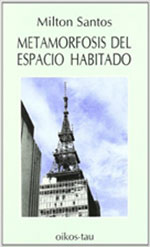 |
Metamorfosis Espacio Habitado (1996)
by Milton Santos |
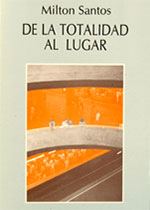 |
| Angury. |
| |
|
|
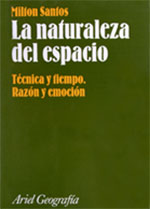 |
Santos, M. (2000).
La naturaleza del espacio:
Técnica y tiempo; Razón y emoción.
Barcelona: Ariel. |
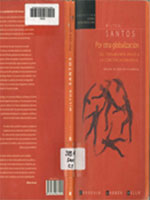 |
Santos, M. (2004).
Por otra globalización:
Del pensamiento único a
la conciencia universal.
Bogotá: Convenio Andrés Bello |
| |
|
|
Books in Portuguese |
|
| |
Santos, M (1948).
O Povoamento da Bahia: Suas causas econômicas.
Salvador: Imprensa Oficial da Bahia. |
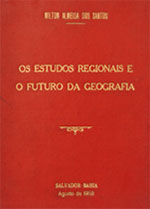 |
Os estudos regionais e o
futuro da geografia,
Imprensa Oficial da Bahia,
Salvador/B A, 1953 |
| |
|
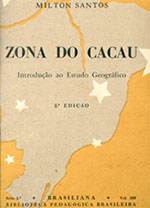 |
Zona do cacau.
Introdução ao estudo geográfico,
1ª edição,
Imprensa Oficial da Bahia, Artes Gráficas, Salvador/BA, 1955.
2ª Edição: Companhia Editora Nacional, São Paulo, Col. Brasiliana,
vol. 296, Biblioteca Pedagógica Brasileira, 1957. |
 |
Os estudos regionais e o
futuro da geografia,
Imprensa Oficial da Bahia,
Salvador/B A, 1953 |
| |
|
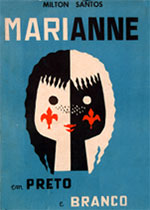 |
Santos, M. (1960).
Marianne em preto e branco.
Salvador: Livraria Progresso Editora. |
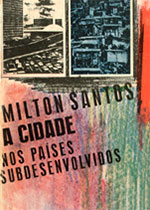 |
Santos, M. (1965).
A Cidade nos países subdesenvolvidos.
Rio de Janeiro: Civilização Brasileira.. |
| |
|
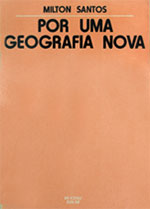 |
Santos, M. (1978).
Por uma geografia nova.
São Paulo: Hucitec. |
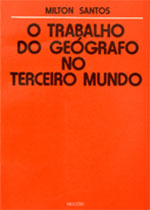 |
Santos, M. (1978).
O trabalho do geógrafo n
o terceiro mundo.
São Paulo: Hucitec. |
| |
|
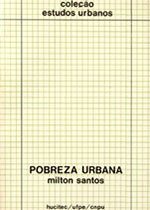 |
Santos, M. (1978).
A pobreza urbana.
São Paulo: Hucitec. |
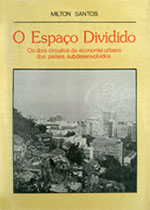 |
Santos, M. (1978).
O espaço dividido.
Rio de Janeiro: Livraria
Editora Francisco Alves. |
| |
|
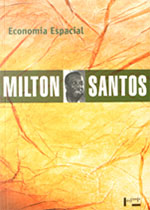 |
Santos, M. (1978).
Economia espacial:
Críticas e alternativas.
São Paulo: Hucitec. |
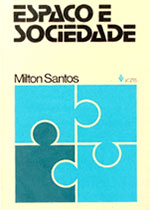 |
Santos, M. (1979).
Espaço e sociedade.
Petrópolis: Vozes. |
| |
|
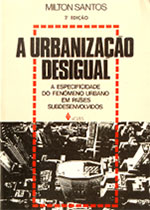 |
Santos, M. (1980).
A urbanização desigual.
Petrópolis: Vozes. |
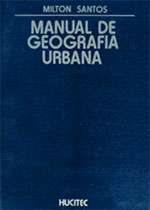 |
Santos, M. (1981).
Manual de geografia urbana.
São Paulo: Hucitec. |
| |
|
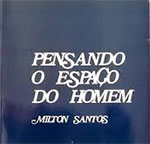 |
Santos, M. (1982).
Pensando o espaço do homem.
São Paulo: Hucitec. |
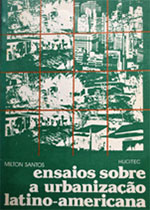 |
Santos, M. (1982).
Ensaios sobre a urbanização
latino-americana.
São Paulo: Hucitec. |
| |
|
| |
Santos, M. (1985).
Espaço e método.
Sao Paulo: Nobel. |
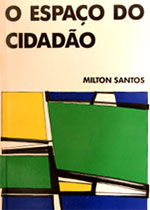 |
Santos, M. (1987).
O Espaço do cidadão.
Sao Paulo: Nobel. |
| |
|
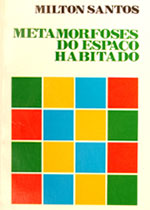 |
Santos, M. (1988).
Metamorfoses do espaço habitado.
São Paulo: Hucitec. |
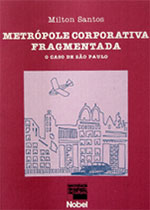 |
Santos, M. (1990).
Metrópole corporativa fragmentada:
O caso de São Paulo.
Sao Paulo: Nobel. |
| |
|
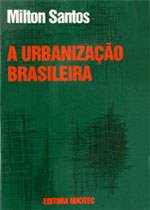 |
Santos, M. (1993).
A urbanização brasileira.
São Paulo: Hucitec. |
|
Santos, M. (1994).
Por uma economia política da cidade.
São Paulo: Hucitec - Editora PUC-SP. |
| |
|
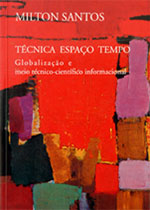 |
Santos, M. (1994).
Técnica, espaço, tempo:
Globalização e meio técnico-científico informacional.
São Paulo: Hucitec. |
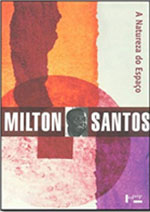 |
Santos, M. (1996, 2003).
A Natureza do espaço:
Técnica e tempo; Razão e emoção.
São Paulo: Hucitec. |
| |
|
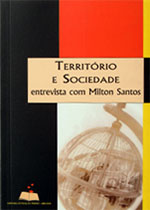 |
Santos, M. (2000).
Território e sociedade:
Entrevista com Milton Santos.
São Paulo: Fundação Perseu Abramo. |
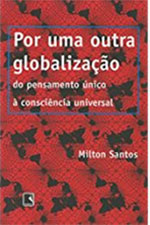 |
Santos, M. (2000).
Por uma outra globalização:
Do pensamento único à consciência universal.
Rio de Janeiro: Record. |
| |
|
| |
Santos, M., & Silveira, M. L. (2000).
O ensino superior público e particular
e o
território brasileiro.
Brasília: ABMES. |
|
Santos, M., & Silveira, M. L. (2001).
O Brasil: Território e sociedade
no início do século XXI.
Rio de Janeiro, Brazil: Record |
| |
|
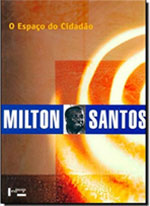 |
O Espaço do Cidadão (2010, 2014)
by Milton Santos |
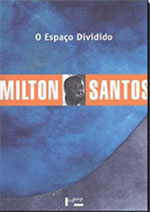 |
O Espaço Dividido.
Os Dois Circuitos da Economia Urbana
dos Países Subdesenvolvidos (2005)
by Milton Santos |
| |
|
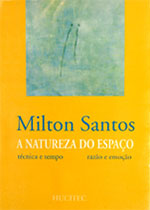 |
A Natureza do Espaço.
Técnica e Tempo. Razão e Emoção.
Hucitec,
São Paulo, 1996. (3ª edição: 1999) |
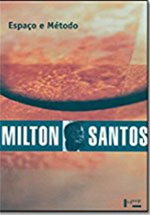 |
Espaço e Método (2010)
by Milton Santos |
| |
|
|
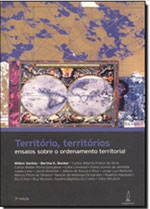 |
Território, Territórios. Ensaios Sobre O
Ordenamento Territorial
Portuguese Brazilian, 2007 |
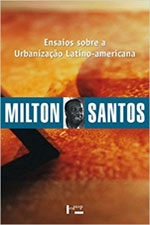 |
Ensaios Sobre a Urbanização
Latino-americana (2010)
by Milton Santos |
| |
|
|
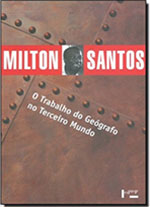 |
O Trabalho do Geógrafo no
Terceiro Mundo (2009)
by Milton Santos |
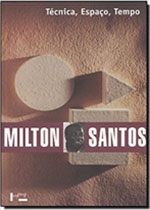 |
Técnica, Espaço, Tempo. Globalização e
Meio Técnico-científico Informacional (2007)
by Milton Santos |
| |
|
|
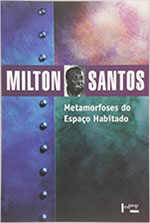 |
Metamorfoses do Espaço Habitado.
Fundamentos Teóricos e
Metodológicos da Geografia (2007)
by Milton Santos |
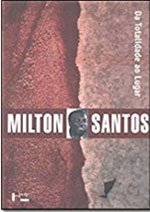 |
Da Totalidade ao Lugar (2005)
by Milton Santos |
| |
|
|
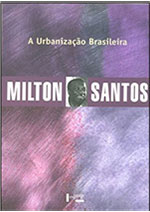 |
A Urbanização Brasileira (2004)
by Milton Santos |
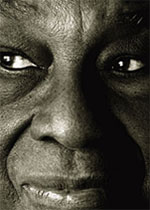 |
O País distorcido:
o Brasil, a globalização e a cidadania
(organização, apresentação
e notas de Wagner Costa Ribeiro
e ensaio de Carlos Walter Porto Gonçalves),
Publifolha, São Paulo, 2002. |
| |
|
|
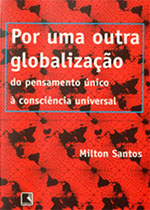 |
Por uma outra globalização.
Do pensamento único à consciência universal.
Record, Rio de Janeiro, 2000. (4º edição: 2000) |
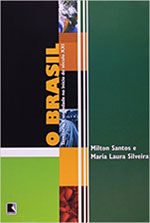 |
O Brasil: território e sociedade
no início do século XXI
(Milton Santos em colaboração
com Maria Laura Silveira),
Record, Rio de Janeiro, 2001 (2009) |
| |
|
|
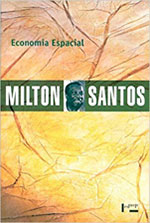 |
Economia Espacial.
Críticas e Alternativas (2004)
by Milton Santos |
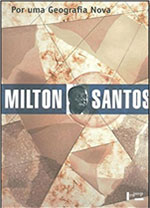 |
Por Uma Geografia Nova.
Da Crítica da Geografia a
Uma Geografia Crítica (2008)
by Milton Santos |
| |
|
|
| |
Pensando o Espaço do Homem (2005)
by Milton Santo |
|
| |
Books and Articles on Milton Santos |
|
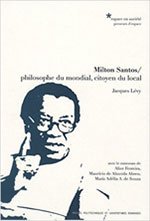 |
Levy, Jacques (Ed.) (2007).
Milton Santos, philosophe du mondial,
citoyen du local.
Paris: Presses Polytechniques et Universitaires Romandes. |
|
Maurel, J. (1996).
Homenaje al profesor Milton Santos.
Anales de Geografía de la
Universidad Complutense, 16, 203-223. |
| |
|
|
| |
Scripta N. (2002).
El ciudadano, la globalización y la geografía:
Homenaje a Milton Santos. 6 (124).
http://www.ub.edu/geocrit/sn/sn-124.htm. (Accessed 18 Aug 2001) |
 |
Milton Santos (Em Portuguese do Brasil)
(Portuguese Brazilian) Paperback – 2001
by Jesus de Paula Assis |
| |
|
|
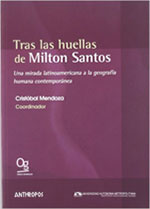 |
Tras las huellas de Milton Santos :
una mirada latinoamericana a
la geografía humana contemporánea
(Anthropos Paperback 2008)
by Cristóbal Mendoza Pérez |
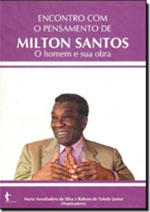 |
Encontro com o Pensamento de Milton Santos.
O Homem e Sua Obra (Em Portuguese do Brasil) ( 2006)
by Maria Auxiliadora da Silva |
| |
|
|
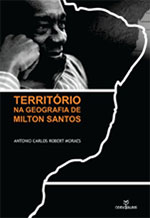 |
Território na geografia de Milton Santos
(Portuguese Edition) Kindle Edition
by Antonio Carlos Robert Moraes |
|
| |
|
|
|
|